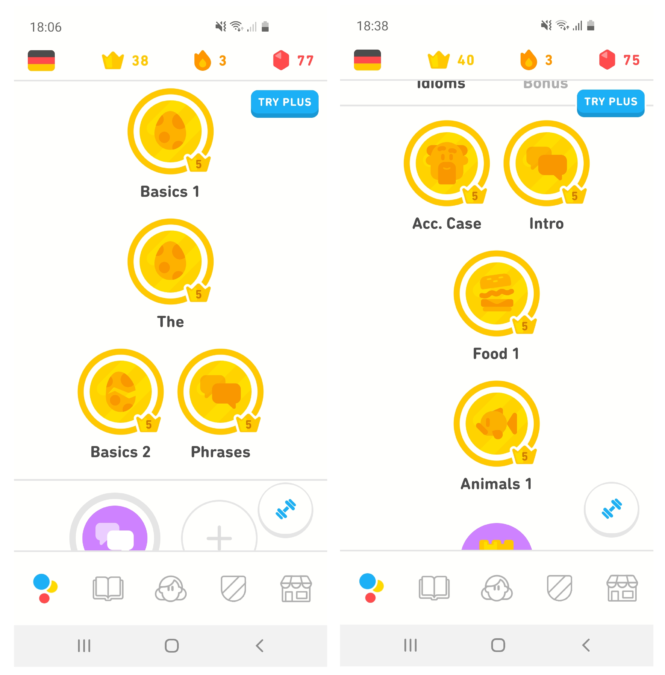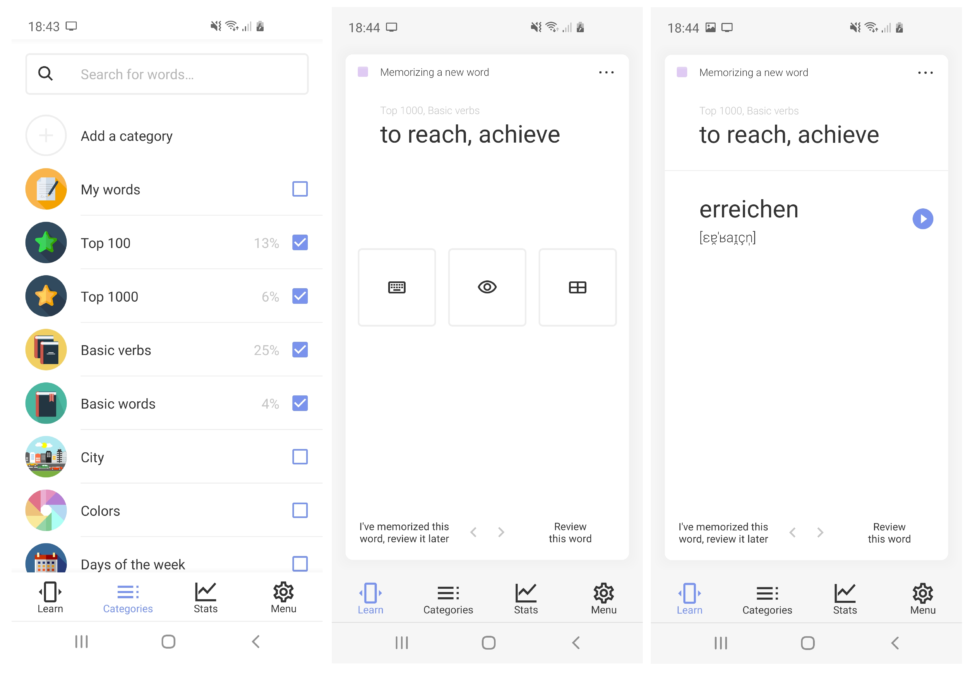
Learning a new language is one of the most common bucket list tasks for people around the world, and with a multitude of freely available language apps, it should be easy, right? But how effective are free language apps like Duolingo? Can they expand your vocabulary and improve your grammar, or are they only good for learning the conversational basics?
I recently tried using two of them consistently for a month to see if free language apps can really be relied on as a main language learning tool. Here's how I got on!
Choosing the right language learning apps
My language of choice was German for my little experiment. I've lived in Germany for a couple of years now, but because my work revolves around writing and speaking English the majority of the day, my German has remained quite basic. I chose Duolingo as the first language app because of its immense popularity — with over 100 million downloads and 4.7-star rating on Google Play, it is the language learning app of choice for many. For vocabulary, I went with the lesser-known German with ReWord. It uses flashcards and gives you the option to either type memorized words or pick from multiple choice answers. I used the free version of the app which allows you to practice a limited number of words per day.
I chose these two apps because they provide a good mix of vocabulary and grammar learning together, but also because I didn't have to spend a cent if I didn't want to. For many, free language apps are the preferred choice because they allow more flexibility without worrying about wasting subscriptions when you don't have time to spare. Of course, I've also tested other popular language apps like Memrise and Drops, but their free versions did not offer as much as Duolingo and Reword.
I spent around 15 minutes using each app of choice every day. Before beginning this little experiment, I took a placement test that put me at A1 or beginner German level. While I didn't expect to make the jump to A2 in just a month of casual learning, I was at least hoping to see significant improvements to my grammar and vocabulary. Duolingo itself claims that 15 minutes a day is all you need to improve your language skills. So, without further ado, here are my results and impressions.
Duolingo
There is a good reason Duolingo is so popular. The app's interface is clean and easy to use and the app grants access to all of its lessons for free. The variety of languages on offer is great too: from Spanish to Latin, to Nahavo, and even High Valyrian. Not all lessons are made equal, however. German is one of the languages that, thanks to its popularity, is well served with a bunch of great lessons that offer vocabulary and grammar tips.

Although I've previously studied some German, I started from the basics to refresh any existing knowledge. I breezed through the first couple of sections expecting the difficulty to ramp up. This is where Duolingo kind of disappointed me — even past the basics, the lessons contain a lot of repetition. I've said and typed some phrases so much, I am sure I will be able to recite them in my sleep. This might be useful for complete beginners, but even for them, I think it's not an entirely productive approach. All sections contain five levels, but the overall number of lessons per section differs — usually between 10 and 30. For some sections the high number of lessons is understandable and useful, for others completely unnecessary. There are only so many ways you can introduce yourself, for example. Yes, the Introductions section helped with verb conjugation as well, but it got tiring pretty quickly, even with only 15 lessons.
Duolingo offers a way to remedy this, however. You can use lingots (in-app currency) to take a progress test or you can subscribe to Plus to take progress tests that can move you along even faster. This was a welcome addition and I took advantage of it several times. However, I also noticed that prompts to restore XP in some sections are quite frequent. Of course, practicing is never a bad idea, but when you are completing lessons almost daily, it's just more tedious repetition that costs you precious time that could be dedicated to learning new things.

On a more positive note, Duolingo actually has a nice variety of exercises. They cleverly incorporate not just vocabulary, but learning noun genders, sentence structure, and grammar all in one, without overwhelming you. Stories are another great learning tool recently introduced to Duolingo German. You can listen to a short story and answer questions related to it. It's a practical addition that demonstrates how natural dialogue flows and tests your comprehension better than simple translation does. In the same vein, it would be great to see exercises that allow you to construct your own short texts and stories. This is an essential part of every language course because it forces you to think in the language and express yourself in it. It's something you will have to do every day if you live in a foreign country and want to become fluent in the local language.
Overall, however, I would say that Duolingo helped me get back on track with German. I wouldn't say it was truly sufficient as a main language learning tool, but it was good for practicing and learning (or relearning) the essentials.
German with ReWord
You might be asking why I chose to use a vocabulary app alongside Duolingo. In my view, once you get the hang of basic grammar, vocabulary is what opens to doors to having conversations and immersing yourself in the language. If you only know phrases that you'd use when grocery shopping or ordering at a restaurant, it's hard to make small talk with your neighbors or colleagues.

I picked German with ReWord as my vocabulary app after testing out many other similar alternatives. I did so because it allows you to choose from different categories of words, including the top 1,000 most used, and because of its flashcard interface. Admittedly, the app has a lot it can improve upon. It doesn't have separate tabs for learning new words and quizzing you on memorized ones. Despite this, I liked that ReWord gave me the option to pick between typing and multiple-choice when revising. I could also choose to review words I wasn't sure I memorized later.
But how much did I actually learn? I used the free version of the app and set my daily goal to 15 words a day or 450 words a month. Although I used ReWord regularly, I feel that I learned less than 100 words that I actually incorporated in my daily vocabulary.
A big thing that was missing for me was context. You can only see the German word and its English translation on the flashcards. No example sentences, phrases or the like. I see this as a major flaw, because simply memorizing words without understanding how to use them properly makes them a lot easier to forget or misuse. Nuance is lost too. For example, "schmekt" in German means "to taste," but the phrase "Es schmekt" on its own means "It's tasty" rather than "It tastes."
Similar sounding words or those with similar spelling should also have been separated by a good margin because it's easy for beginners to confuse and mix them up. However, I do feel that if some of these improvements are implemented, German with ReWord could be an excellent app for expanding your vocabulary. I still don't think it will suffice on its own, but it's a useful language learning tool regardless.
Final results and impressions

So, what has my app learning experience taught me? That free language apps are very useful, but that you can't rely on them alone, especially if you only have a short amount of time to dedicate to them daily. Of course, I didn't expect to become a German expert after a month, but I do feel I could have learned more. I might be in the Duolingo Emerald league, but I am still at an A1 level with slightly better results after taking another placement test.
Based on my experience, I think I'll be using free language apps as supplemental learning tools.
While others may fare better than I did or may discover apps with even better lesson plans, many still lack the exercise variety, language immersion, and guidance you would get from an actual language course. On the bright side, however, using Duolingo and Reword made me more confident when speaking German and renewed my interest in the language, which are important steps on the road to becoming fluent!
If you want to perform this experiment yourself, be sure to check out our list of the best language apps and give them a try to see how far they can take you.
Do you use language apps? What has your experience with them been like? Share your thoughts with us in the comments.












No comments:
Post a Comment